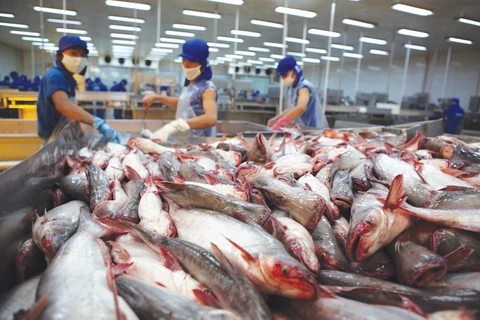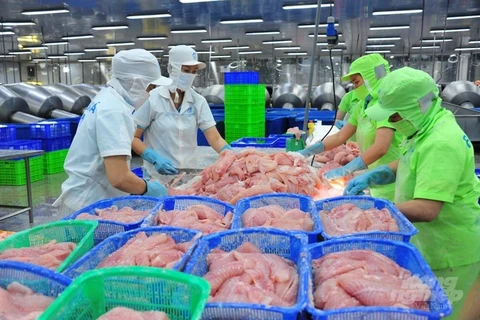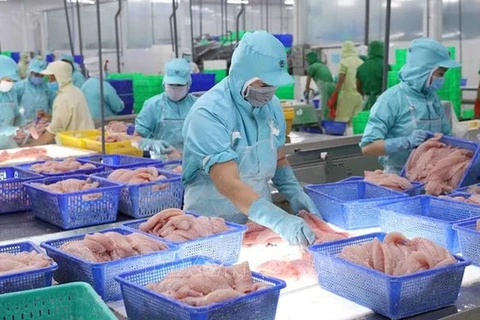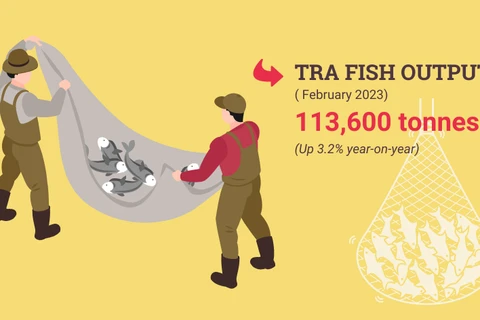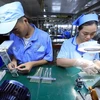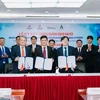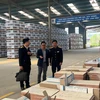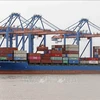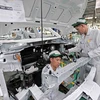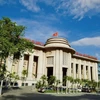Hanoi (VNA) – Stronger investment into processing by-products of tra fish will be a way for Vietnam to optimise their huge potential and values amid the expanding tra fish sector, according to experts.
Statistics showed that each year, aquaculture provides 4.5-5 million tonnes of materials for aquatic processing. In the tra fish sector, 60-70% of the materials for tra fish fillet processing become by-products.
Tran Dinh Luan, Director of the Directorate of Fisheries, said by-products, including include head, bones, fin, skin and organs, are a source of materials that can promote the added value for the tra fish sector if they are optimised.
For example, raw tra fish skin is often sold at 3,000 VND (0.13 USD) per kilo. However, the price of collagen and gelatine made from it is 1,000 times higher, at about 3 million VND per kilo, said Doan Toi, General Director of Nam Viet Corporation (Navico).
Toi said that in early April, Navico and its partner from the Republic of Korea launched a 7-million-USD factory producing collagen and gelatine from fish skin, with a capacity of processing 780 tonnes of materials per year. In the second and third phase, the factory’s capacity is scheduled to reach 1,200 and 2,400 tonnes per year, he said.
This is the first factory that can produce collagen peptide in Vietnam. Navico expects 1.5 million USD of profit in the first phase. By now, the factory has received orders from 15 customers.
Like Navico, Vinh Hoan Corporation in the Mekong Delta province of Dong Thap has also engaged in collagen and gelatin production from fish skin, which has contributed 10% to the overall profit of the company.
Meanwhile, the Asia Fish Oil Corporation in Dong Thap province has successfully produce fish oil from tra fish fats with a capacity of processing 400 tonnes of materials.
At the same time, the firm has also processed other by-products from tra fish into organic fertilisers and animal feed.
Directorate of Fisheries head Luan advised businesses to invest more in technology, enhancing the economic efficiency in processing products with high added values, while making full use of the Government’s policies to encourage the development of processing sector, heading to a circular economy in the fisheries sector.
Huynh Minh Tuan, Vice Chairman of the People’s Committee of Dong Thap, said that the locality always encourages local firms to renovate their tra fish processing towards higher added value, aiming to make the most of the by-products and contributing to the growth of this billion-USD sector.
Data from the Vietnam Association of Seafood Exporters and Producers (VASEP) showed that in the first two months of this year, revenue from seafood export topped 1.1 billion USD, down 26% year on year, with tra fish exports dropping 38% to 240 million USD.
However, tra fish industry will have to overcome difficulties and become profitable again in the third quarter of this year as demand is likely to recover from the third quarter as festive events in year-end are coming and the Chinese market is opening./.
Statistics showed that each year, aquaculture provides 4.5-5 million tonnes of materials for aquatic processing. In the tra fish sector, 60-70% of the materials for tra fish fillet processing become by-products.
Tran Dinh Luan, Director of the Directorate of Fisheries, said by-products, including include head, bones, fin, skin and organs, are a source of materials that can promote the added value for the tra fish sector if they are optimised.
For example, raw tra fish skin is often sold at 3,000 VND (0.13 USD) per kilo. However, the price of collagen and gelatine made from it is 1,000 times higher, at about 3 million VND per kilo, said Doan Toi, General Director of Nam Viet Corporation (Navico).
Toi said that in early April, Navico and its partner from the Republic of Korea launched a 7-million-USD factory producing collagen and gelatine from fish skin, with a capacity of processing 780 tonnes of materials per year. In the second and third phase, the factory’s capacity is scheduled to reach 1,200 and 2,400 tonnes per year, he said.
This is the first factory that can produce collagen peptide in Vietnam. Navico expects 1.5 million USD of profit in the first phase. By now, the factory has received orders from 15 customers.
Like Navico, Vinh Hoan Corporation in the Mekong Delta province of Dong Thap has also engaged in collagen and gelatin production from fish skin, which has contributed 10% to the overall profit of the company.
Meanwhile, the Asia Fish Oil Corporation in Dong Thap province has successfully produce fish oil from tra fish fats with a capacity of processing 400 tonnes of materials.
At the same time, the firm has also processed other by-products from tra fish into organic fertilisers and animal feed.
Directorate of Fisheries head Luan advised businesses to invest more in technology, enhancing the economic efficiency in processing products with high added values, while making full use of the Government’s policies to encourage the development of processing sector, heading to a circular economy in the fisheries sector.
Huynh Minh Tuan, Vice Chairman of the People’s Committee of Dong Thap, said that the locality always encourages local firms to renovate their tra fish processing towards higher added value, aiming to make the most of the by-products and contributing to the growth of this billion-USD sector.
Data from the Vietnam Association of Seafood Exporters and Producers (VASEP) showed that in the first two months of this year, revenue from seafood export topped 1.1 billion USD, down 26% year on year, with tra fish exports dropping 38% to 240 million USD.
However, tra fish industry will have to overcome difficulties and become profitable again in the third quarter of this year as demand is likely to recover from the third quarter as festive events in year-end are coming and the Chinese market is opening./.
VNA

